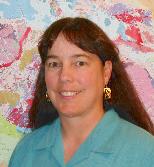Instructor: Mary Lou Bevier
Office: rm. 156 EOS South
Phone: (604) 822-4655
E-mail: mbevier 'at' eos.ubc.ca

Instructor: Mary Lou Bevier
|
 |
| Lectures: |
||
| Tues / Thurs 10-11 |
rm. 121 |
EOS Main |
| Labs (2 hrs.): |
||
| Tues 11-1 |
rm. 127 |
EOS Main |
| Weds 1-3 |
rm. 127 |
EOS Main |
| Weds 3-5 | rm. 127 | EOS Main |
| Required field trip | ||
| Normally held on 3rd Saturday -
|
Jericho Beach or tba |
|
You are encouraged to seek out additional mineralogy
and petrology textbooks for use in this course; the instructor is happy to comment
on your selections. In addition, there is a wealth of mineralogical and petrological
material available on the web, although one must always verify the information
independently, unless it is known to be on a peer-reviewed web site.
(Peer-reviewed means that publications that have undergone a rigorous review
both for content and structure, prior to publication, by other geoscientists
actively involved in the same field of research. Peer-reviewed journals are
found in hard copy and in e-versions.)
Criteria for assessing student comprehension of course material (grades) are listed below:
| 3X5 cards, other in-class participation | 5% |
| Field trip exercise | 5% |
| Mineral report | 5% |
| Rock project | 15% |
| Lecture midterm | 15% |
| Lecture final exam | 25% |
| Mineral lab exam |
10% |
| Rock lab exam | 20% |
| Total | 100% |
| Plus bonus marks for completing EOS-SEI* assessments. | 1% |
Makeup of graded exam(s) that are missed due to illness or other reasons is solely at the discretion of the instructor. It is each student's responsibility to inform the instructor as soon as possible if/why they cannot take an exam at the scheduled time or if/why they missed an exam(s), so that the instructor can decide if and/or how the exam(s) will be made up. EXCEPTION: Specific UBC Academic Concession regulations apply to the final lecture exam; if you miss or will miss a final lecture exam due to illness, conflict with a religious holiday, or other reasons, see a Faculty Advisor ASAP.
*What is EOS-SEI? The Department of Earth and Ocean Sciences (EOS) at University of British Columbia is involved in a major new collaboration with the Carl Wieman Science Education Initiative (CWSEI). The goals of this multi-year project are to improve science teaching and learning within our department by developing new, creative teaching and learning tools, implementing appropriate assessments aligned with teaching and learning goals, and building expertise within EOS that will sustain our commitment to excellence in teaching and learning for many years to come. We are tremendously excited about this opportunity to improve science education for the general public as well as for future professionals in earth, ocean, and atmospheric sciences. New instructors with EOS-related backgrounds plus passion for and experience in the teaching and learning of science will help implement some of these changes in EOSC 324.